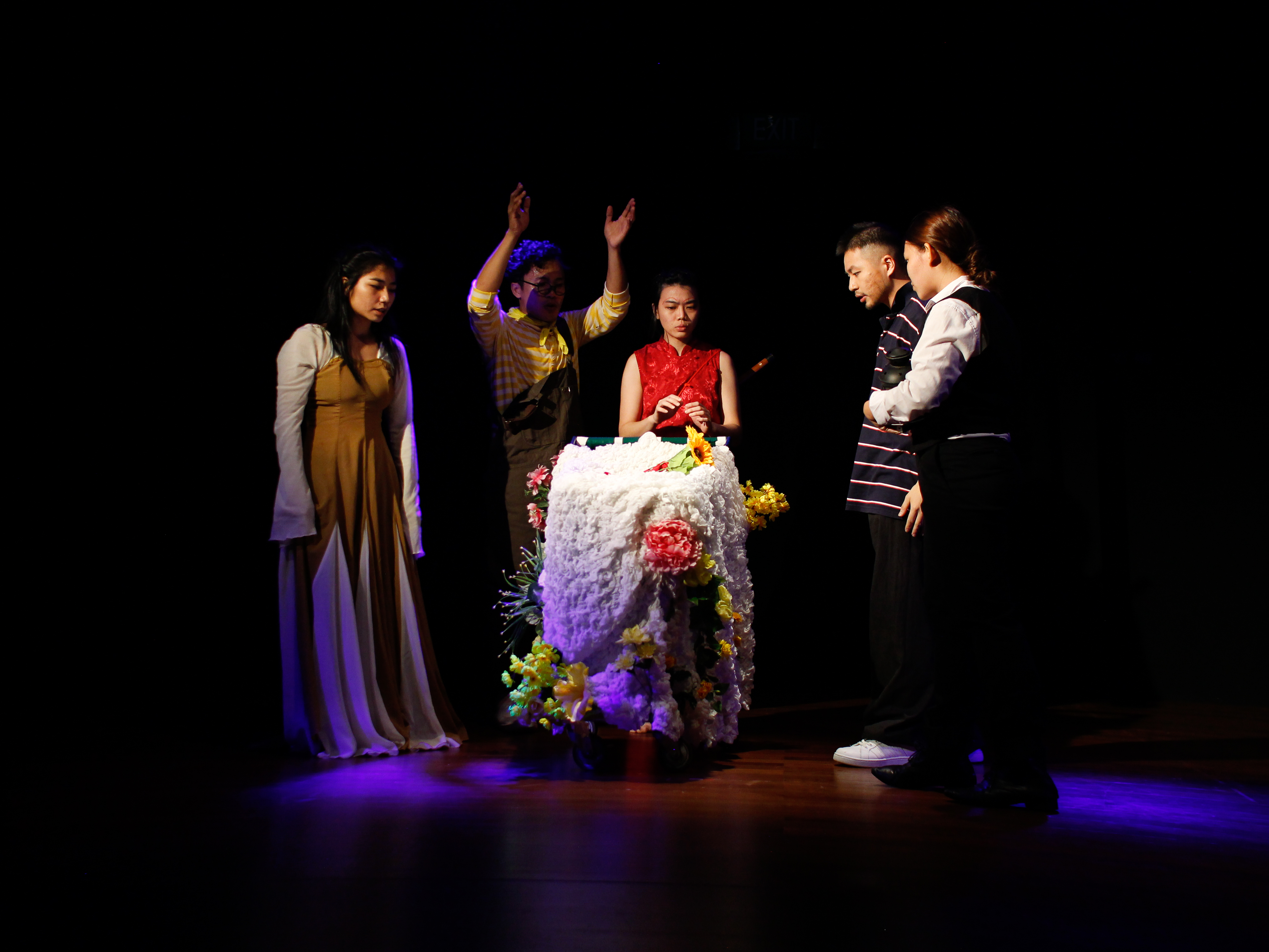剧评:ROMEI
文化是生死命题的钥匙—— 观“ROMEI”
文/梁海彬
五个灵魂困在中阴之间,在一年一度的聚会里,他们在观众群寻找他们想见的人。他们直接和观众交流,他们无法走到观众席,就像他们无法走出他们对生死的怨恨与爱恋。灵魂有机会在观众面前阐述自己对生的眷恋,对死的疑惑,他们以英语向观众阐述自己的遭遇,但是在表达深切的情感时,却是以他们的本族语言唱歌、或是念诵。
于是语言不仅仅只是传达思想,剧中角色在面对生与死的巨大困惑时,通过本族语言,向自身文化索求,与自身文化连结。而所有深厚古老的文化,必然有其对生死命题的思考与回应。到了最后,角色们在歌声中,甚至用彼此的语言一起唱歌。于是观众明白,文化不仅仅是属于某个族群的,而是可以相互借鉴与参考,进而达到共同的领悟、庇护、或救赎。
在拉丁文中,“文化”的原意是“灵魂的培养”,这些灵魂生前所处的生活方式、价值观念、审美与道德、精神与风俗,都形成了这些灵魂的样貌。在这个奇异的空间里,灵魂们看似陷入困境,但与文化重新接轨以后,渐渐获得某种程度上的净化—— 演出开始时,他们绕着棺木行走,陷于轮回,口中念念有词;结束时,他们依然念念有词,却一个个得以从大门离开了。
在普世的生死议题面前,观众容易动容。灵魂们唱歌时,都是清唱。没有音乐伴奏,观众听见的是音节与声波在空间的震动,以及角色情感的抒发和宣泄。这些灵魂暂居肉身,出现在观众面前,所做的事,便是以肉身之本能和观众产生共鸣。所谓文化,是否就是人身?人与人的沟通与交流,除了通过语言的字面意义,是否还有更深沉的方式,例如身体的共鸣—— 因为我们都有肉身,所以我们能够体会到他们的怨恨与痴迷、希望与向往。
角色们轮流进行独白,观众虽然于是得以了解每一个角色的处境,但可惜的是,灵魂之间少了交流的机会,以致到了最后,所有灵魂一起大合唱,还很顺利地就能接上彼此的文化,并获得共识,这样的情节便显得稍微有些突兀。但我是在鸡蛋里挑骨头了。演员们的演技扎实,内心戏细腻丰富,在黑箱空间里,他们利用身体,时而跳舞,时而形成“梯级”让灵魂攀爬,在迷惘中或跌或坐。他们以身体改变空间,让空间幻化出角色们内心焦虑与不安的情感,以强大的能量牵扯观众的情绪。
在空净的舞台上,没有多媒体,甚至没有录制的音效设计,创作团队以剧场的基本元素(空间、时间、身体)便成功让观众全程投入,实在是非常具启发性的。“Romei”是米佐语,意思是在雾里徘徊。这群来自4个不同国家的演员们以其自身文化互相进行碰撞和探索,在雾里相互扶持,在世界局势动荡不安的今天,创作出人与人之间沟通与交流的另一种可能性,让人雀跃。
关于演出:2022年12月9日,8PM,Centre 42 黑箱剧场,ROMEI创作团队呈现
点击阅读相关资料:https://romei.peatix.com/view
***
"Cultures and roots: the way forward in the paradox of life and death": Watching "ROMEI"
Translated from Chinese to English by Choo Ming Jing
It’s that time of the year; five spirits trapped in the Antrabhara convene, searching for the ones they seek amongst the spectators. They speak directly to the audience, but the invisible lines of the stage restricts their footsteps, just as their obsession with life and death binds them to their state of not-being. The spirits take their chance to express: their longing for life, their questions about death. When speaking about their misfortunes, English seems to be a medium suffice to express coherently, but they resort to their native tongues in songs and poems when expressing deeper emotions.
In Romei, language becomes much more than a tool of communication. It becomes a plea to their roots to connect, seeking the truths in the paradox of life and death; with their native tongue, they call upon the wisdom of those who have spoken the same words before them, the answers they seek explored through the ages. This culminates in a song circle between the spirits, using words and sounds from the native languages from the others, and realization dawns on the audience: our cultures and roots do not isolate from one another, but instead blend and build upon the wisdom of others, such that the protection, enlightenment, or redemption that is sought might be attained.
In Latin, the word “culture”, or cultura, means “the cultivation of the soul”. A product of the lives they have lived, the five spirits on stage are the outward representation of the values, morals and ideals they held before death. The space on stage is one that is suspended between worlds, effectively trapping the spirits in a paradox, a reconnection with their roots to achieve enlightenment and purification the only way out. At the beginning of the play, they mumble to themselves as they pace endlessly around a coffin, stuck in the loop of metempsychosis; at the end, they slowly exit the space, still mumbling to themselves.
One will be touched, when confronted with the universal theme of life and death. The spirits sing without backing instrumentals or music, their emotions plainly on display between the melodies and sounds, reverberating through the theatre and audience. Such resonance is not merely audible, but also felt in the interactions between the physical bodies inhabited by the spirits and the audience, in the visceral and paleolithic movements of the bodies. Such brings the question: are our bodies a manifestation of our culture? In interactions between individuals, is there something more than verbal communication, perhaps the syllabic movements of our bodies? Watching the movements on stage, we felt the emotions of the spirits as clearly as if they were our own: resentment, obsession, hope and longing.
The spirits take turns explaining their predicament with monologues, such that the audience could clearly understand their situations despite the parallel stories. But the increased interaction with the audience meant a lack of interaction between the spirits themselves, and the final chorus of songs became slightly out of pace; how did the spirits manage to conjoin with the others so easily? Of course, such splitting of hairs does not discount the work of the actors. Solid acting fundamentals and well-thought backstories, expressed through the fluid dance and movements of the bodies, falling and jumping in vertigo, at times even forming human structures to be clambered upon, all painted a beautiful work of art for the audience. Using their bodies as tools, the space in the Black Box theatre was bent and molded by the spirits, tugging at the heartstrings of the audience with the feelings of anxiety and desperation they emanated.
It was inspiring, in the ways the creative team utilized the basic elements of theatre: space, time and body. The stage was minimalistic, void of the now ubiquitous elements of multimedia and pre-recorded soundtracks, but the audience was enthralled nonetheless. Romei, a word from the Mizo tongue used by the Mizo people of northeast India, means “to linger in the fog”. And that summarized the work of the team of actors from 4 different nationalities: to clash and explore the culture of others in the fog, stumbling and working together as they gingerly danced forward. In the tumultuous world that is the present, having the pleasure to watch an exploration of how else humanity could seek to communicate brings a smile to my lips, and a hope in my heart.
Performance watched: 9th December 2022, 8pm at Centre 42 black box, presented by the team of ROMEI
Performed by
Marvin Acero Ablao
Ng Yuan Ci
Oliver S.K. Wu
Rhian Hiew
Ruthi Lalrinawmi
Directed by Rhian Hiew
--------------------------------------------------------
This is a collaborative work by a group of theatre-makers and artists from Malaysia, Philippines, India and Macau. After studying and work together at Intercultural Theatre Institute (ITI) in Singapore, the group gather and wish to create a theatre work that can bring new spirit to the audiences.







Comments
Post a Comment